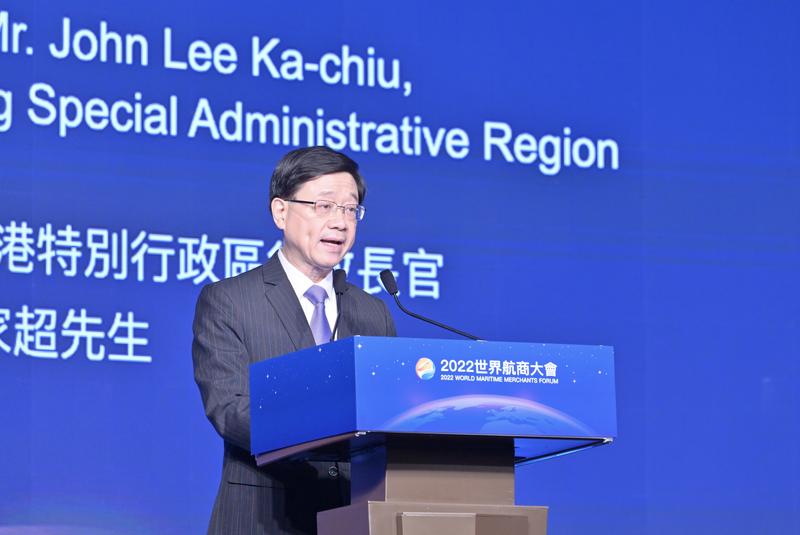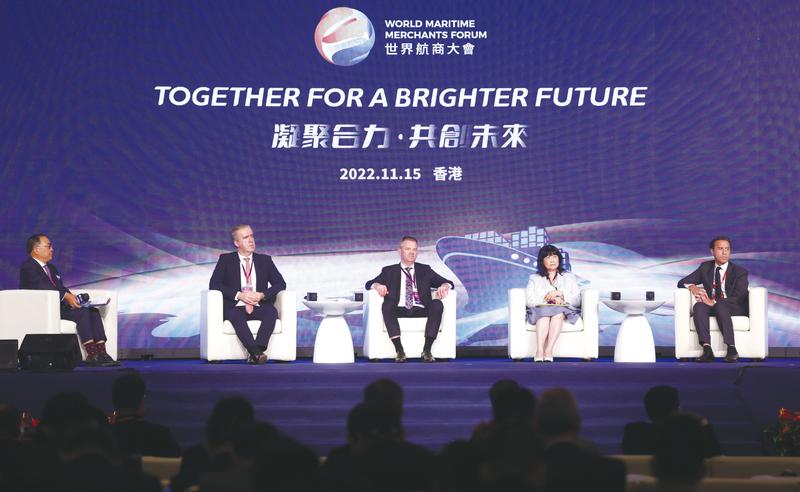 Chief Executive John Lee Ka-chiu speaks at the 2022 World Maritime Merchants Forum. (PHOTO PROVIDED TO CHINA DAILY)
Chief Executive John Lee Ka-chiu speaks at the 2022 World Maritime Merchants Forum. (PHOTO PROVIDED TO CHINA DAILY)
“Green”, “smart”, and “safe” will remain the recurring and accentuated vocabulary in the global shipping lexicon of this era, where the specter of the relentless COVID-19 pandemic and aggravating climate change cut through the whole world. And Hong Kong commands the capacity to lead the charge together with the Guangdong-Hong Kong-Macao Greater Bay Area, industry leaders said at the second World Maritime Merchants Forum on Tuesday.
Under the threat of climate change and the disruption of state-of-the-art technologies transforming across all industries, green and smart shipping has to be the talk of the town within the global maritime realm for many years, said Wellington Koo, chairman of Hong Kong Shipowners Association.
As the government of the Hong Kong Special Administrative Region aspires to develop Hong Kong into an international financial and technology center with the support and backup of the Greater Bay Area, Hong Kong’s shipping sector must be an integral part of this visionary plan for obvious reasons, he said.
“In particular, the COVID-19 pandemic has, once again illustrated the strategic importance of shipping on which nearly 90 percent of the world supply chains rely. To ensure the efficient and effective running of these supply chains, the shipping sector must continue to grow smart in every sense,” Koo said.
The climate change issue has never stopped looming large and the clock is ticking on Hong Kong’s target of becoming carbon neutral by 2050, Koo said, adding that we cannot afford to delay giving the shipping industry a green overhaul.
“As a big share of the world’s fleet is owned by Chinese players, including those in the Hong Kong SAR, the role of the HKSAR is indispensable (in pioneering the sea change). For the sake of both present and future generations, we must take the initiative to become as green as possible,” remarked Koo.
With the support of the Greater Bay Area, Koo said he is convinced that Hong Kong has a wealth of potential to be a strong advocate for smart and green shipping. “Indeed, given the concentration of shipping knowledge and major players in Hong Kong, we can leverage Hong Kong to spearhead new technologies and ideas, and the GBA as the springboard to all the Chinese mainland markets and end users, such as the shipyards,” said Koo.
 Panel discussion between (from left) Li Lianjun, senior partner of Reed Smith LLP and head of the transportation and commercial litigation practice; Michael Fitzgerald, deputy CFO of Orient Overseas Container Line; Norbert Kray, senior vice-president and regional manager of Maritime Region Greater China of DNV; Rosita Lau, partner of Ince & Co and chairman of the promotion and external relation committee at Hong Kong Maritime and Port Board; and Ahmed Fahmy, regional medical director of International SOS. (Calvin Ng / China Daily)
Panel discussion between (from left) Li Lianjun, senior partner of Reed Smith LLP and head of the transportation and commercial litigation practice; Michael Fitzgerald, deputy CFO of Orient Overseas Container Line; Norbert Kray, senior vice-president and regional manager of Maritime Region Greater China of DNV; Rosita Lau, partner of Ince & Co and chairman of the promotion and external relation committee at Hong Kong Maritime and Port Board; and Ahmed Fahmy, regional medical director of International SOS. (Calvin Ng / China Daily)
Looking ahead, Koo said he believes “green shipping financing” will make its way into the mainstream. In this emerging area, Hong Kong can flex its muscles through its well-developed financial services as well as a legal, tax and regulatory system that is fully in line with international standards, reckoned Koo. “It is therefore also a big window for connecting our country, including the GBA to the rest of the world.”
As many counties are struggling in an unstable sociopolitical environment, ship safety has become even more important to ensure the continuous operation and prosperity of the industry.
Safety procedures help but are not the ultimate answer and the guarantee, said Bjorn Hojgaard, the CEO of Anglo-Eastern Univan Group. Instead, he called for a mindset shift, from a “culture of compliance” to a “culture of commitment”.
In recent catastrophic years, with COVID-19 lingering and the Russia-Ukraine conflict raging, coupled with other sociopolitical chaos, a company’s safety culture is not merely a checklist or toolbox or simply about setting up procedures, Hojgaard contended. “Rather, a safety culture is the measure of core values, commitment, and collective behaviors of an organization to emphasize prevention over production, to ensure protection of people and the environment.”
During the panel discussion on the restructuring and reshaping of the shipping industry chain, Rosita Lau Sui-yee, a partner and maritime law specialist with Ince and Co, highlighted the significance of “uniform” shipping laws during the post-pandemic era.
“Shipping owners have to work together with other maritime partners. … Sharing information helps save lives. I hope governments can also work together to teach the industry as well, because without the support of an administration, the private maritime industry cannot really attain its target,” she said.
Michael Fitzgerald, deputy chief financial officer of Orient Overseas Container Line, warned that shipping lines must be “very careful” in the face of relentless inflation as that will impact on market demands and costs.
“Customers’ spending has not really fallen yet, but it could very easily do,” Fitzgerald said, “But over time, inflation’s impact will come from … the incredible cost of fuel.”
Contact the writers at jenny@chinadailyhk.com


